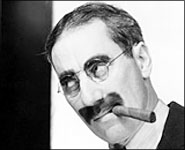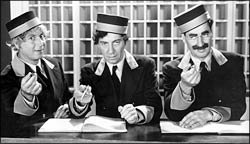 |
|
If there's one celebrity who's as recognizable as Elvis, it's Groucho Marx. (Photo Courtesy of the Arthur Marx Collection)
|
Groucho vs. Elvis
Is Marx the Real King of Pop Culture?
You Bet Your Life!
An article by Buck Wolf, ABC News
Call it a conspiracy. A Marxist conspiracy. But I saw Groucho Marx dashing through a hotel gift shop last weekend in Lake Saranac, N.Y., chomping on an oversized cigar.
I admit I'd just driven 300 miles through the night and I may have been high from the smell of scented candles. But I swear, Groucho lives.
There we stood, eye to eye. He cocked his legendary greasepaint brow and said, "I never forget a face ...But in your case, I'll make an exception." Sure, I've heard that line before. Who hasn't? But it's a Groucho original. The king of put downs put me down. Insulted by the master! What an honor!
"I can't believe it!" I gushed. "I'm talking with the great Groucho Marx! Are you really alive?" Groucho, as always, seemed underwhelmed, his great mustache dripping with contempt. "You've got the mind of a 4-year-old boy," he said, stalking off. "And I bet he was glad to get rid of it!" And before I could say, "Hello, I must be going," he was gone.
Was I crazy? Certainly, scads of Presley fans regularly experience "Elvis sightings." One minute he's pumping gas in Montana, then he's munching on a Big Mac in Oklahoma, or bargain hunting at a Target.
According to news reports, Groucho had died on Aug. 19, 1977, just three days after Elvis. But if one man could secretly be living a secret life on the sly, why can't it be a double death hoax? Call Oliver Stone! I think I've plotted his next movie, Elvis and Groucho Lost in America.
Groucho's Terrible Timing
If Groucho really did die, he picked a lousy time to do it. And that's funny, considering the comic was known for his great timing. In life, he graced the cover of Time twice - once in 1932 and again in 1951. Yet editors pushed his obituary (a few measly lines) to the back of the magazine, to make way for Elvis. To quote Groucho: "If that isn't an insult, I don't know what is."
Now, each year, thousands of Presley pilgrims flock to Graceland to mark the anniversary of his death and the news media rehashes the well-worn details of his life. What about Groucho? It seems we give short shrift to the comic master who once said, "I'd never join a club that would have me as a member." And that's just one of many Groucho-isms. Woody Allen used that that line in Annie Hall to describe why his relationships always fail. After all, how could he like a woman who likes him? A fair point. But Groucho - that subversive master of the absurd - was aiming much higher when he made his most famous quip.
 |
| Harpo, Chico and Groucho Marx in the 1938 film Room Service. (Arthur Marx) |
In the roaring '20s, Groucho was finally a star. The Marx Brothers were the toast of Broadway, with hits like The Coconuts and Animal Crackers. They had struggled for years in obscure theaters and, now, Paramount Pictures had signed them to a fat contract.
It was then that an exclusive country club in Sands Point, N.Y., invited Groucho and his family to join. Of course, that invitation was withdrawn when they found Groucho was Jewish. Club officials explained that Jews weren't allowed in the pool.
"What about my son? He's only half Jewish," Groucho said. "Can he go into the water up to his knees?"
Years later, another ritzy country club offered Groucho membership. That's when he refused to join any club that would include members "like him." Perhaps it was the greatest statement ever made about social climbing.
Marx Not a Communist
Groucho - born 45 years before the King, in 1890 - always knew how to offend anyone worth offending. He perfected the insult. That brash attitude vaulted him from the stage to the screen with his brothers, and then to radio and TV as a solo act, a career spanning six decades.
"I've got a good mind to join a club and beat you over the head with it," Groucho tells his rival in Duck Soup, voted by the American Film Institute as one of the top five comedies of all time.
In it, Groucho plays Rufus T. Firefly, the leader of Fredonia, a mythical country on the verge of war, and his brothers Harpo and Chico play spies. Can Groucho as the statesman Firefly negotiate a peace plan? "It's too late," he tells a foreign diplomat. "I've already paid a month's rent on the battlefield."
It's no wonder that Duck Soup, released in 1935, became a cult classic in the Vietnam era, or that FBI chief J. Edgar Hoover kept close tabs on Groucho, apparently fearing Americans would be corrupted by Marxism. Interestingly, Groucho's 186-page FBI dossier, released five years ago, revealed that the Communist Party was just one more club that Groucho didn't join. Gee, I wonder why? Perhaps it didn't help Groucho's reputation at the FBI that he's also credited with this observation: "Military intelligence is a contradiction in terms."
Lydia the Tattooed Stock Broker.
In recent weeks, so many Americans lost fortunes on Wall Street. Perhaps they can take some comfort in Groucho, who was cleaned out in the great stock market crash of 1929. An extremely frugal man, Groucho saved for years, but weathered three costly divorces after the stock market crash. As he would say, "I worked myself up from nothing to a state of extreme poverty."
Years later, in the 1950s, he was invited to take a tour of the New York Stock Exchange. Suddenly, while in the observation booth, he grabbed the public address system and began singing "Lydia the Tattooed Lady" and "When Irish Eyes Are Smiling." Trading stopped, as a sergeant at arms tried to wrest control of the microphone.
"Listen, you crooks," Groucho yelled out to the trading floor. "You wiped me out of $250,000 in 1929. For that kind of dough, I'm entitled to sing if I want to." So, for about 15 minutes, trading came to a halt, as Groucho got his money's worth, singing, dancing and telling jokes, as the Wall Street stock ticker ran blank and traders cheered.
Equal Opportunity Offender
More often than not, Groucho was a man of inspired nonsense. This is a man who once shot an elephant in his pajamas. How the elephant got in his pajamas, we'll never know. And this self-educated, voracious reader became one of America's greatest wits. "Outside of a dog, a book is a man's best friend," Groucho said. "Inside of a dog, it's too dark to read." By the time he was emceeing the game show You Bet Your Life on radio and TV, contestants were lining up to subject themselves to Groucho's abuse, and he was an equal opportunity offender.
He once asked a tree surgeon, "Have you ever fallen out of a patient?" He told an author, "It won't do you any good to plug your book on my show, because none of our listeners can read."
Groucho, it seemed, could say anything to anybody, and he couldn't be flattered. "Mr. Marx, I'd like to thank you for all the joy that you've put into this world," a Catholic priest once said. "And I'd like to thank you for all the joy you've taken out of this world," Groucho replied.
Even when he won a prestigious Peabody Award for being Radio's Best Comedian of the Year in 1949, Groucho disparaged George Foster Peabody, in whose honor the award was named. "It's a good thing he died," he said, "or we wouldn't have won any prizes."
As we mark the anniversary of Groucho's death, his son, Arthur, is planning the release next month of Groucho: A Photographic Journey, a collection of previously unreleased photos, many of them taken by Arthur with the camera his dad bought him as a young boy. "I ran around the house snapping pictures and my father didn't care," said Marx. "I don't think he expected that he'd be remembered the way he did, or quoted so often."
The coffee table book takes readers through a tour of the golden age of Hollywood, showing Groucho and his brothers at home and work, with candid shots of such luminaries as Bob Hope, Frank Sinatra, Lucille Ball and Marilyn Monroe.
 |
|
Frank Ferrante, widely considered the foremost Groucho Marx interpreter, keeps the comic legend alive. (Arthur Marx)
|
Marx collaborated on the book with Frank Ferrante, whom he cast about 15 years ago to star as his father in the Off-Broadway play Groucho: A Life in Review.
"One thing about Groucho, he didn't need to be loved," said Ferrante, who's appeared in revivals of Marx Brothers plays and has toured with his own Evening With Groucho show.
"He'd go on stage and say whatever it took to be funny. He never really showed a lot of love. But the audience showed a lot of love for him."
For all of Groucho's experiences in show business, he never encountered Elvis, the man with whom he'd be linked because of the proximity of their passing. "I can tell you this," Arthur Marx said, "I'm sure he didn't think about him too often."
All Shook Up
Ironically, in the late 1950s, the president of the Elvis Presley Fan Club appeared on You Bet Your Life. True to form, Groucho was so unimpressed, he didn't think her club was worth talking about. Here's what happened:
Groucho: "Are you interested in matrimony?"
Fan Club President: "Indeed I am."
Groucho: "Do you have any other interests?"
Fan Club President: "You haven't mentioned Elvis Presley."
Groucho: "I seldom do, unless I stub my toe."
Needless to say, the Elvis Presley Fan Club never had Groucho Marx as a member.